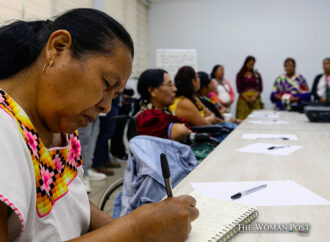Through three women from Mexico, Peru, and Colombia, conservation solidifies its role in protecting wildlife.
Mexican Yuliana Bedolla was recently recognized with the 2023 Whitley Award for her work against invasive species on Natividad and San Benito Oeste Islands in Baja California, which threatened wildlife such as the Black Petrel and the Ashy Storm-petrel birds.
Bedolla, who conducts her wildlife protection work through her specialization in marine biology, received £40,000 as recognition for her defense of the habitat of these Pacific Ocean birds.
Read more content like this at: thewomanpost.com
Both the Black Petrel and the Ashy Storm-petrel are listed as threatened species by the International Union for Conservation of Nature (IUCN). Their daily lives were invaded by rats and cats eradicated by the Mexican scientist.
The activity of these mammals, hunting adult specimens and preying on chicks, posed a threat to the development of these birds whose natural habitat had been in danger for two decades. Thanks to Yuliana Bedolla's work, wildlife have recovered. The biologist has integrated local women and fishermen cooperatives into her conservation efforts, contributing to the ongoing monitoring of the birds.
Critically endangered primates
In Peru, a tireless woman works in favor of preserving the yellow-tailed woolly monkey. This is anthropologist and biologist Fanny Cornejo, who has spent 15 years developing strategies to protect the Peruvian Amazon rainforest and wildlife where this critically endangered primate lives.
Cornejo is the founder of the civil association "Yunkawasi," which focuses on the care of endangered species through research and environmental education, with the support of Andean and Amazonian communities.
She was chosen to receive the Indianapolis Prize Emerging Conservationist Award, granted to those who stand out in their fight against species extinction. The US$50,000 grant supporting the award will be used by the biologist to combat human activities that have destroyed 80% of the forests where the yellow-tailed woolly monkey lives.
You can also read We cannot continue to ignore The Message that the earth sends
Rescuing the name of Elizabeth Kerr
For several years, Colombian naturalist and ornithologist Elizabeth Kerr has been dedicated to collecting information about the avifauna of her country, including the names of over 500 bird species.
Kerr's name remained lost in a document written by naturalist Frank Chapman, but it was reclaimed by five Colombian ornithologists who contribute their scientific work to the "Expeditions BIO Wings, Songs, and Colors" project. They are Jessica Díaz, Juliana Soto, Natalia Ocampo-Peñuela, Estefanía Guzmán, and Daniela García.
Juliana Soto, currently pursuing a Ph.D. at the University of Illinois, United States, and part of the research group at the Alexander von Humboldt Institute for Biological Resources Research in Bogotá, Colombia, found the data provided by the forgotten Elizabeth Kerr and organized an expedition with four female colleagues to retrace her steps through various regions of Colombia, reclaim her discoveries, and recognize her conservation legacy.
According to Soto, Elizabeth Kerr was an extraordinary woman who spent six years exploring the Colombian rainforests with nothing but a rifle, a tent, and some provisions as her companions.
In recovered Kerr documents, the following quote can be found: "A woman must possess two qualities to be a successful naturalist: love for nature and fearlessness."

























Leave a Comment
Your email address will not be published. Required fields are marked with *